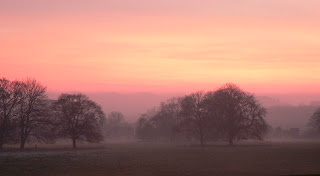What am I experiencing? it seems like the pull of the most wonderful beauty together with a strong and painful awareness that such beauty is so very ephemeral. Why can't I grab it and hold it and never let it go? Like the most beautiful sunset you see you know it will be gone in minutes and no other sunset will ever be quite like it. Beauty is not graspable it seems.
But two things come to my mind about these experiences.
First of all I found myself, yesterday especially, really aware again of the passage of my life; the recognition that it is rolling on, day after day to a conclusion that is closer with every moment. In faith I trust that that is okay; that it is even good. But at the same time I found to my surprise how much I wanted to cling; to hold fast; to hang on. But I can't do that. Life does not allow clinging. Life does not want us to cling. That is of course, easier said than done but it is part of what is beautiful about God - there is a kind of beckoning, a kind of live now, fully this moment and then let it go because there is more.
Secondly, there is something about overwhelming beauty. Today on the radio someone was asking people to share whether it was important for their places of worship to be beautiful. I found myself saying (to myself) yes, it is important to me because to worship in a place of beauty is to bring me/us closer to God who is Beauty. St Augustine wrote '...late have I loved you oh Beauty ancient and new, late have I loved you...'. He too saw God as Beauty. It does seem to me then that everything beautiful is a reflection of God. So part of my response to these experiences of awesome (in its fullest sense) beauty is my whole being's recognition that I encounter God. That is why it plunges my whole self into a rich mixing of pain and joy.
| And here is beauty in abundance! |
I want to say though that beauty comes in many ways. I remember years ago meeting a girl who was entirely bedridden, unable to speak or to contribute to her own care in any way. But there, in her, I saw a wonderful beauty for she had a smile that was so unexpected and so 'giving' (that is the only word I can think of) that I have never forgotten the gift of beauty I received in meeting her. Or the person in India who, eaten away with leprosy, struggled to make sure that I and my friends could be comfortable while we were visiting their community and who brought us the only chairs they had and placed them in the shade. That kindness too was a gift of beauty.
So beauty is not what we see in the glossies or the films. What I see is that it is all around us but most of all in the depths of our hearts - which is of course, where God is.


